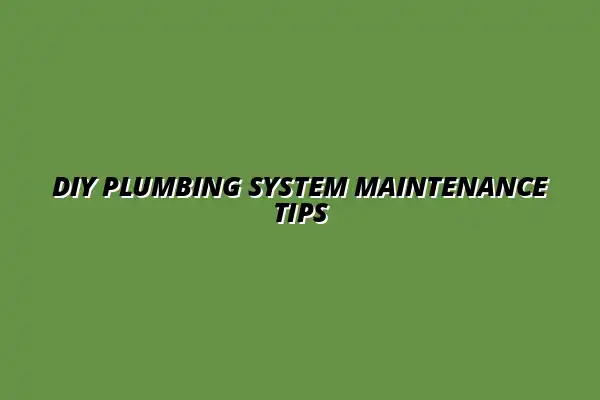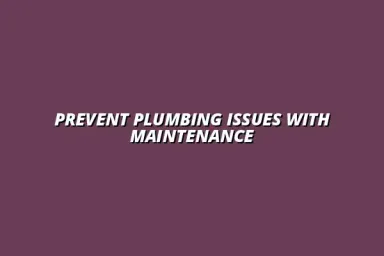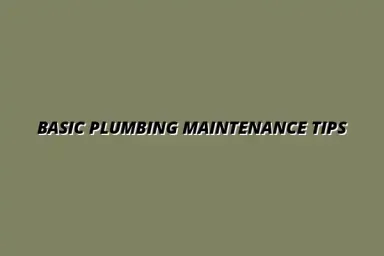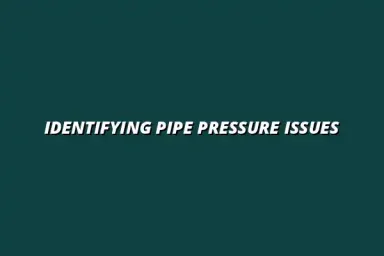Understanding the Importance of Plumbing System Maintenance
Maintaining your plumbing system is crucial for the overall health of your home. A well-functioning plumbing system ensures that clean water flows in and waste is disposed of efficiently. Ignoring maintenance can lead to costly repairs and inconveniences, so it's essential to give your plumbing the attention it deserves!
When we think of plumbing, it's easy to overlook its significance. However, every time you turn on the faucet or flush the toilet, you're relying on a complex network of pipes, fixtures, and appliances. Regular maintenance helps keep this system in top shape, preventing minor issues from escalating into major problems. For helpful tips on maintaining your plumbing system efficiently, check out this guide: Maintain Your Plumbing System Efficiently.
The Role of Plumbing in Home Functionality
The plumbing system plays a vital role in making our daily life comfortable. It is responsible for distributing fresh water throughout the house and safely removing wastewater. Without a properly functioning plumbing system, you could face various challenges, from low water pressure to unexpected leaks. Maintaining your bathroom plumbing pipes is especially important; find out how here: Maintain Your Bathroom Plumbing Pipes.
Additionally, a well-maintained plumbing system can enhance the value of your home. Prospective buyers often look for homes that have updated plumbing and no history of major issues. Thus, taking care of your plumbing can save you money in the long run and make your home more appealing to potential buyers!
- Ensures clean water supply
- Removes waste and contaminants
- Supports heating and cooling systems
Benefits of Regular Plumbing Maintenance
Regular plumbing maintenance comes with a host of benefits that homeowners should not ignore. First and foremost, it helps in preventing costly repairs. By identifying potential issues early on, you can save yourself from expensive emergency fixes later. Learn more about maintaining plumbing to prevent costly repairs with this resource: Maintain Plumbing to Prevent Repairs.
Another significant benefit is improved efficiency. A well-maintained system operates more efficiently, which can lead to lower water bills. Plus, maintaining your plumbing can increase the lifespan of your fixtures and pipes, giving you peace of mind for years to come. Regular maintenance can also help prevent issues like frozen pipes; here are some helpful tips: Preventing Frozen Pipes This Winter.
- Prevents costly repairs
- Improves water efficiency
- Extends the lifespan of plumbing systems
Essential Tools and Materials for DIY Plumbing Care
Being proactive about plumbing maintenance doesn't have to be complicated or expensive. With the right tools and materials, you can handle many minor repairs or issues yourself. This not only saves money but also helps you feel more confident in managing your home!
In the following sections, I’ll cover the basic tools every homeowner should have on hand, as well as common plumbing supplies for minor repairs. Having these items ready means you can tackle issues as they arise, making home maintenance much smoother. For example, cleaning your water heater is a simple task that can extend its life; learn how here: Clean Your Water Heater Easily.
Addressing Frequently Asked Questions About Plumbing Maintenance
Many homeowners have questions about plumbing maintenance, especially if they want to keep their systems in good shape. Addressing these common inquiries can help you understand when to take action and when it might be best to call in a professional. Here are some frequently asked questions that can guide your plumbing care journey. If your pipes are aging, you'll want to pay particular attention to this article: Aging Pipe Maintenance Tips for Homeowners.
How Often Should Plumbing Be Inspected?
Regular inspections are vital for maintaining the health of your plumbing system. Most experts suggest having your plumbing inspected at least once a year. However, if you notice any problems, it’s wise to get an inspection sooner, as early detection can save you money and hassle.
- Annual inspections for proactive maintenance
- Additional inspections if you experience leaks or low water pressure
- Consider inspections more frequently if your home is older or has a history of plumbing issues
When Is It Necessary to Call a Professional?
Sometimes, a plumbing issue is too complicated or serious to handle on your own. Knowing when to call a professional can save you from making things worse. For example, if you have a persistent plumbing issue, a local plumber can be a great resource. Check out this page to find a reliable plumber: Plumber in Kingstanding, Birmingham. Here are some signs that it's time to reach out for expert help.
- Persistent leaks that you cannot fix
- Clogged drains that won't clear with a plunger
- Low water pressure that remains an issue
- Water damage around plumbing fixtures
Building Good Habits for Ongoing Plumbing Care
Creating good habits around plumbing maintenance can help you avoid costly repairs down the road. By incorporating simple practices into your daily routine, you can keep your plumbing system functioning smoothly. Here are some habits to consider.
Daily Practices to Prevent Plumbing Issues
Preventative care can go a long way in ensuring your plumbing stays in top condition. Here are some daily practices that can help prevent problems from developing.
- What Not to Flush: Avoid flushing items like wipes, cotton balls, and paper towels.
- Routine Checks: Monitor your water pressure and look for any unusual changes.
What Not to Flush: Items to Avoid
While it might be tempting to flush certain items down the toilet, doing so can lead to clogs and other plumbing issues. Here are some common items to keep out of your toilet.
- Wipes (even those labeled as flushable)
- Feminine hygiene products
- Dental floss
- Food scraps
Routine Checks for Water Pressure
Checking your water pressure can help you catch issues early. If you notice water pressure is too high or too low, it could indicate a problem in your plumbing system. Make sure to keep an eye on this as part of your regular maintenance.
Long-Term Strategies for Plumbing System Longevity
To extend the life of your plumbing system, developing long-term strategies is essential. Investing time and resources into your plumbing can pay off in the long run. Here are some strategies to consider.
Investing in Quality Fixtures
Choosing high-quality fixtures can significantly reduce the chances of leaks and repairs over time. It’s worthwhile to consider the types of materials used in your plumbing fixtures. Look for those that are durable and designed to withstand wear and tear.
Scheduling Regular Maintenance Reminders
Set reminders for yourself to schedule regular maintenance checks. This can help you stay ahead of potential issues and keep your plumbing in good shape. Don’t hesitate to reach out to a plumber for an annual inspection or as needed.
Sustaining Your Plumbing System: Final Thoughts
Maintaining your plumbing system requires diligence and care, but the payoff is well worth it. By understanding the importance of regular checks, developing good habits, and knowing when to call a professional, you can keep your plumbing in excellent condition.
Recapping Key Maintenance Techniques
To summarize, remember these key maintenance techniques:
- Inspect your plumbing annually
- Know when to call a professional
- Implement daily plumbing care habits
- Invest in quality fixtures
Encouraging Proactive Plumbing Care
Finally, adopting a proactive approach to plumbing care can prevent headaches later on. Take the time to educate yourself about your plumbing system and develop a routine that prioritizes its health. A little effort goes a long way in sustaining your plumbing system!

 Kiran Almasi
Kiran Almasi

